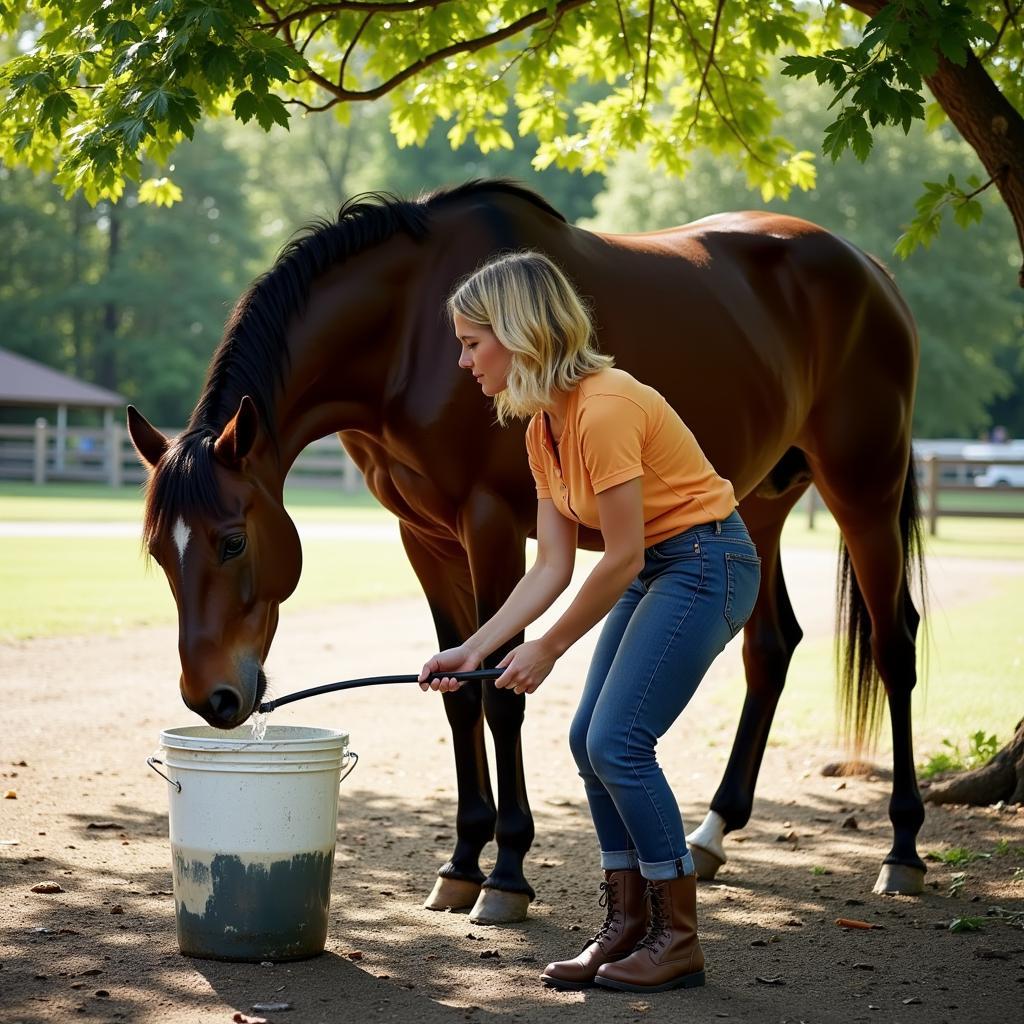Horses, like all living creatures, are susceptible to heat stress. As responsible horse owners, it’s crucial to understand how high temperatures impact our equine companions and how to keep them safe during the warmer months. While horses can tolerate a range of temperatures, there comes a point when it becomes dangerously hot for them.
 Horse Showing Signs of Heat Stress
Horse Showing Signs of Heat Stress
Understanding Equine Heat Tolerance
Horses regulate their body temperature differently than humans. They rely heavily on sweating to cool down. However, when humidity is high, sweat evaporation becomes less effective, making it harder for them to cool down. This can lead to a dangerous rise in body temperature and potentially life-threatening conditions like heat stroke.
Recognizing the Signs: When is it Too Hot for Your Horse?
Knowing the signs of heat stress in horses is crucial for early intervention. Be on the lookout for:
- Rapid breathing and elevated heart rate: A horse’s respiratory rate naturally increases in hot weather, but if you notice excessively rapid breathing or flaring nostrils, it’s a warning sign.
- Profuse sweating: While sweating is normal, a horse that’s drenched in sweat, even when relatively inactive, may be overheating.
- Lethargy and decreased appetite: Horses suffering from heat stress often become sluggish and lose interest in food and water.
- Elevated temperature: A horse’s normal temperature ranges from 99.5 to 101.5 degrees Fahrenheit. Anything above this range indicates a problem.
Factors Influencing Heat Tolerance in Horses
While ambient temperature plays a significant role, several factors can influence a horse’s susceptibility to heat stress:
- Humidity: High humidity hinders sweat evaporation, making it harder for horses to cool down.
- Breed and coat color: Dark-colored horses absorb more heat than lighter-colored horses. Additionally, some breeds are naturally more heat tolerant than others.
- Body condition: Overweight horses are more prone to heat stress.
- Fitness level: Horses in good physical condition generally handle heat better.
- Acclimatization: Horses gradually adjust to warmer temperatures. Sudden changes in weather can increase the risk of heat stress.
 Providing Water and Shade for Horses
Providing Water and Shade for Horses
Protective Measures: Keeping Your Horse Safe in the Heat
Taking proactive steps to mitigate the risks of heat stress is essential for horse owners:
- Provide ample shade: Ensure access to shaded areas, such as trees, run-in sheds, or purpose-built shelters.
- Fresh, cool water is vital: Always have plenty of clean, cool water available. You can add electrolytes to their water to encourage drinking and replenish lost minerals.
- Limit strenuous activity: Avoid riding or working your horse during the hottest parts of the day. Opt for early mornings or cooler evenings instead.
- Cooling baths: Consider hosing your horse down with cool water, especially focusing on the neck, chest, and legs.
- Monitor closely: Regularly check your horse for signs of heat stress. Early detection is key to preventing serious complications.
When to Call the Veterinarian
If you suspect your horse is suffering from heat stress, contact your veterinarian immediately. Heat stroke is a life-threatening condition that requires prompt veterinary attention.
 Veterinarian Attending to a Horse Suspected of Heat Stroke
Veterinarian Attending to a Horse Suspected of Heat Stroke
Additional Tips for Horse Owners
- Consider using fans in stables and barns to improve ventilation.
- If transporting your horse in hot weather, ensure adequate ventilation in the trailer.
- Be mindful of ground temperature, especially asphalt, which can get extremely hot and burn your horse’s hooves.
Conclusion
Keeping your horse safe and comfortable during the summer months is a top priority. By understanding the dangers of heat stress, recognizing the warning signs, and implementing proactive measures, you can help your equine partner beat the heat and thrive throughout the year. Remember, when it comes to horses and hot weather, prevention is always better than cure. If you have any concerns about your horse’s health, consult with your veterinarian for expert advice.
FAQs About Horses and Heat
Q: At what temperature is it too hot to ride a horse?
A: While there’s no magic number, use the Heat Index, which factors in both temperature and humidity. Generally, if the Heat Index is above 90 degrees Fahrenheit, it’s best to avoid strenuous activity with your horse.
Q: Can I give my horse ice to cool down?
A: While ice can be tempting, it’s best to avoid giving large amounts of ice to horses. It can cause digestive upset. Offer cool, not ice-cold, water instead.
Q: What are the signs of heat stroke in horses?
A: Signs of heat stroke in horses include a temperature above 103 degrees Fahrenheit, stumbling or collapse, seizures, and lack of sweating despite being overheated. This is a life-threatening emergency requiring immediate veterinary care.
Need More Information?
For more information on horse care and related topics, visit these resources on our website:
- Hock sores on horses
- Michigan horse laws
- Helmet for horse
- Horse tail bags
- What temperature is too hot for horses
Get in Touch!
For any questions or concerns, our team at Justus Horses USA is here to help. Contact us at:
Phone Number: 0772127271
Email: [email protected]
Address: QGM2+WX2, Vị Trung, Vị Thuỷ, Hậu Giang, Việt Nam
We have a 24/7 customer support team ready to assist you.